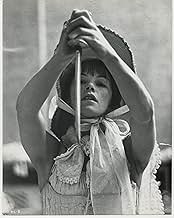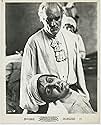IMDb RATING
7.5/10
2.8K
YOUR RATING
In an insane asylum, Marquis de Sade directs Jean Paul Marat's last days through a theater play. The actors are the patients.In an insane asylum, Marquis de Sade directs Jean Paul Marat's last days through a theater play. The actors are the patients.In an insane asylum, Marquis de Sade directs Jean Paul Marat's last days through a theater play. The actors are the patients.
- Awards
- 2 wins & 1 nomination total
Robert Langdon Lloyd
- Jacques Roux
- (as Robert Lloyd)
Featured reviews
You do not need to know the details of French history to enjoy (?) this most astonishing and confrontational movie. Remember that this is a cinematic version of a play, and that Director Peter Brooks never loses sight of the physical presence and power that his original stage version was renowned for. Unlike many cinematic treatments of stage drama, this film is essentially theatre - the camera in fact intensifies the claustrophobic setting and puts the viewer in the front row. The performances are uniformly excellent : the intensity and conviction of the cast in their roles is exceptional. This is an emotionally draining, bravura movie that once seen, can not be forgotten.
This takes place in 1808 in an insane asylum. The Marquis de Sade (Patrick Magee) puts on a play of an assassination for an audience. He uses the other inmates as actors. Things slowly get out of hand leading to a truly horrifying ending.
I first caught this way back in 1980 at a center for adult education. It was a video of the movie shown for free. The picture was murky and the sound was terrible. Still I sat through it. I just caught it again (over 20 years later) on cable. This time I could see and hear it clearly. I'm not going to pretend that I understand what this is about, aside from the basic premise about a bunch of inmates putting on a play, and I do know it was based on a stage play. Still, I watched all 2 hours. The acting is great across the board but Magee, Ian Richardson and Glenda Jackson (in her major film debut) are exceptional. The movie is disturbing--I realize these are all actors playing roles but they're so good that you believe everything you're seeing. The direction also is masterful--it opens up the play cinematically. It has an R rating but that's mostly for subject matter and a brief nude scene with Richardson. This isn't for everybody--some people will be bored silly by it--but for those who like challenging movies this fits the bill. The ending is very disturbing. I give it a 7.
I first caught this way back in 1980 at a center for adult education. It was a video of the movie shown for free. The picture was murky and the sound was terrible. Still I sat through it. I just caught it again (over 20 years later) on cable. This time I could see and hear it clearly. I'm not going to pretend that I understand what this is about, aside from the basic premise about a bunch of inmates putting on a play, and I do know it was based on a stage play. Still, I watched all 2 hours. The acting is great across the board but Magee, Ian Richardson and Glenda Jackson (in her major film debut) are exceptional. The movie is disturbing--I realize these are all actors playing roles but they're so good that you believe everything you're seeing. The direction also is masterful--it opens up the play cinematically. It has an R rating but that's mostly for subject matter and a brief nude scene with Richardson. This isn't for everybody--some people will be bored silly by it--but for those who like challenging movies this fits the bill. The ending is very disturbing. I give it a 7.
10synzh
I was hooked on this movie the minute I laid eyes upon it... bought the video and meticulously transcribed every word onto my copy of a transcript. I found the Shakespearean troupe to be excellent in their portrayals of madmen performing a play. The French Revolution being the main theme, echoed by various inmates' views of it, as well as several forays into philosophical thinking of man's condition. Plenty of symbolism, hard to draw a line where reality ends and madness begins (is it history, the play, the actor, the character, the madman, the script, etc.). Bears repeated watchings well, if one is interested in terrific character portrayal, philosophy, history, mental illness in general, etc. Asks that you pay close attention at all times, however... some of the extended debates between De Sade and Marat are absolutely riveting to watch. The interplay of several levels of perception is fascinating, and the overall effect is definitely one of a real insane asylum, disturbingly so at times. There is much humour here as well, again on multiple levels... this is definitely an intellectual movie, a thinking man's movie... all action takes place in the single bathouse of the asylum. Many aspects both of history and the philosophies of revolutionary leaders and their antagonists are explored. Highly recommended watching.
MARAT/SADE is the film version of a play that arose from an actor's workshop exploring various theatrical theories expressed by French actor-director-writer Antoine Artard, who extolled a style of performance he described as "theatre of cruelty"--which, broadly speaking, consists of an assault upon the audience's senses by every means possible. Ultimately, and although it makes effective use of its setting and the cinematography mirrors the chaos expected of such a situation, the film version of MARAT/SADE is less a motion picture than a record of a justly famous stage play that offers a complex statement re man's savagery.
The story of MARAT/SADE concerns the performance of a play by inmates of an early 1800s insane asylum, with script and direction by the infamous Marquis de Sade. (While this may sound a bit far-fetched, it is based on fact: de Sade was known to have written plays for performance by inmates during his own incarceration in an asylum.) The story of the play concerns the assassination of the revolutionary Marat by Charotte Corday, but the play itself becomes a debate between various characters, all of which may be read as in some way intrinsically destructive and evil. Since all the characters are played by mentally-ill inmates of the asylum (the actor playing Marat, for example, is described as a paranoid, and the actress playing Corday suffers from sleeping sickness and melancholia), the debate is further fueled by their insanity, unpredictability as performers, and the staff's reactions to both their behavior and the often subversive nature of the script they play out.
Patrick Magee as de Sade, Glenda Jackson as the inmate playing Corday (it was her breakout performance), and Ian Richardson as the inmate playing Marat offering impressive performances; indeed, the ensemble cast as a whole is incredibly impressive, and they keep the extremely wordy script moving along with considerable interest. Even so, it will be obvious that the material works better as a live performance than as a film, and I do not recommend it to a casual viewer; its appeal will be largely limited to the literary and theatrical intelligentsia. The DVD includes the original theatrical trailer, but beyond this there are no extras of any kind.
Gary F. Taylor, aka GFT, Amazon Reviewer
The story of MARAT/SADE concerns the performance of a play by inmates of an early 1800s insane asylum, with script and direction by the infamous Marquis de Sade. (While this may sound a bit far-fetched, it is based on fact: de Sade was known to have written plays for performance by inmates during his own incarceration in an asylum.) The story of the play concerns the assassination of the revolutionary Marat by Charotte Corday, but the play itself becomes a debate between various characters, all of which may be read as in some way intrinsically destructive and evil. Since all the characters are played by mentally-ill inmates of the asylum (the actor playing Marat, for example, is described as a paranoid, and the actress playing Corday suffers from sleeping sickness and melancholia), the debate is further fueled by their insanity, unpredictability as performers, and the staff's reactions to both their behavior and the often subversive nature of the script they play out.
Patrick Magee as de Sade, Glenda Jackson as the inmate playing Corday (it was her breakout performance), and Ian Richardson as the inmate playing Marat offering impressive performances; indeed, the ensemble cast as a whole is incredibly impressive, and they keep the extremely wordy script moving along with considerable interest. Even so, it will be obvious that the material works better as a live performance than as a film, and I do not recommend it to a casual viewer; its appeal will be largely limited to the literary and theatrical intelligentsia. The DVD includes the original theatrical trailer, but beyond this there are no extras of any kind.
Gary F. Taylor, aka GFT, Amazon Reviewer
10moutona
One must read the play and see the background of Peter Weiss in order to get the full feel of this movie. It is absolutely the best presentation of the politics of man and our inability to ever resolve the major issues of our existence. Peter Weiss has fully captured the unending struggle between the politics necessary to obtain freedom versus that which enslaves. The best parts are the discussions between Sade and Marat as to the results of freedom versus dictatorship and capitalism versus socialism. The entire story provides a voyage through the human comedy and shows the inability of humanity to ever figure out the real truth of our existence and relationship to each other and our socitey. The result is a better understanding of the sinusoidal flow of the give an take of our history.
Did you know
- TriviaCharenton, the asylum depicted in the film, was established in 1645 and still exists and is still in use, although it is now called the Esquirol Hospital (l'Hôpital Esquirol), named for Jean-Étienne Dominique Esquirol, a French psychiatrist who ran the hospital in the 19th Century.
- Quotes
Marquis de Sade: And what's the point of a revolution without general copulation?
- Crazy creditsThe opening credits - the play's title, stage credits and the actors appearing in the film - pop on the screen, one word at a time, until it is filled. The closing credits - the film's production staff - start off with a full screen of words, and they then pop off the screen, one word at a time, until it is completely empty...just as it was when the film began.
- Alternate versionsThe first VHS video release of the film, through Water Bearer Films, includes an expositional opening monologue over the opening titles on black.
- ConnectionsFeatured in Changing Stages (2000)
- How long is Marat/Sade?Powered by Alexa
Details
- Release date
- Country of origin
- Language
- Also known as
- Die Verfolgung und Ermordung Jean-Paul Marats dargestellt durch die Schauspielgruppe des Hospizes zu Charenton unter der Anleitung des Herrn de Sade
- Filming locations
- Production companies
- See more company credits at IMDbPro
Contribute to this page
Suggest an edit or add missing content




































